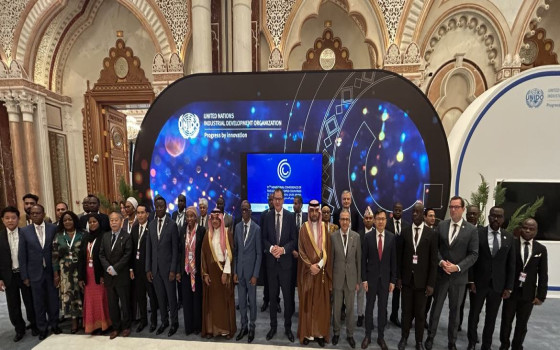
The world's least developed countries take a crucial step towards a more sustainable industrial transformation, but conflicts hinder development.

- Europe and Arabs
- Sunday , 23 November 2025 9:25 AM GMT
Riyadh – New York: Europe and the Arabs
The 44 least developed countries in the world affirmed their commitment to accelerating industrial development and adopting actionable strategies to achieve sustainable development and move beyond their least developed status. According to the UN Daily News, the pledges made at the 11th Ministerial Conference of the Least Developed Countries (LDCs), held in Riyadh, Saudi Arabia, are a crucial step towards ensuring the prosperity of millions of people in these countries within an interconnected global economy. The LDCs represent approximately 13% of the world's population but contribute less than 1% to global trade and foreign direct investment. They are home to about 40% of the world's low-income population, and many are experiencing or emerging from conflict. Among these countries in the Arab region are Yemen, Mauritania, Djibouti, Somalia, and Sudan. The one-day conference, organized by the United Nations Industrial Development Organization (UNIDO) in collaboration with the United Nations Office for Small Island Developing States, LDCs, and Landlocked Developing Countries (UNISDCs), highlighted the importance of industrialization in diversifying the economies of the LDCs, creating employment opportunities for youth and women, and reducing dependence on raw material exports. Conflicts hinder development. Bashar Abdel Rahman Youssef, Advisor to the Sudanese Minister of Industry and Trade, stated that... One of those present emphasized that UNIDO's role, in cooperation with other international organizations working in the industrial and development sectors, is to help Sudan emerge from this crisis.
He added to UN News that this can be achieved "first, by stopping the war; second, by supporting Sudan in its various sectors so that it can restart its factories." Sudan, for its part, presented a project known as the Industrial Sector Reconstruction Project, which we submitted to UNIDO. A side event was dedicated to it, where it is being discussed at the conference.
Like many of the world's poorest countries, Sudan's efforts to develop its economy are severely hampered by conflict.
Least developed countries also suffer from limited socio-economic development, with low and unequal incomes, heavy reliance on agricultural economies, and restricted access to domestic financial resources.
Yes to global solidarity and multilateralism
Gerd Müller, Director-General of UNIDO, said in his opening address to the assembled ministers, "We need a decisive change of direction," reminding them that industrialization is "essential to achieving the Sustainable Development Goals and building resilience to crises."
Müller added, "We need to say yes to global solidarity, to multilateralism, and to preventing the widening gap between rich and poor," noting that 500 Nobel laureates and economists are calling on the world's leading economies to take action.
These experts highlighted the fact that between 2000 and 2024, The wealth of the richest 1 percent of the world’s population increased by 41 percent, while the wealth of the poorest half increased by only 1 percent.
A mission to improve people’s lives
UNIDO’s mission is to help countries overcome these shocks and, through industrialization, become more resilient and improve lives.
Manuel Matiat, Chief of Staff of the organization, highlighted the importance of the strategies adopted by UNIDO in this regard.
He told UN News, “The takeaways from these strategies are how exactly we implement them and what is necessary. What are the major challenges facing some of these developing countries? For example, in terms of their vulnerability to climate change, the current trade wars, all kinds of ongoing conflicts, and the debt problem.”
In Sudan, for example, the organization – as explained by an advisor to the Sudanese Minister of Industry and Trade – is providing support “through three projects. The first is a reconstruction project. The second is a prosthetic limb manufacturing plant. The third is supporting the industrial sector through what is known as pharmaceutical manufacturing.” There is also a final project called the Green Economy Project.
Conference Outcomes
Towards greater solidarity, inclusion, and support, the Ministerial Conference produced two key outcomes:
★️Agreement on the UNIDO Strategy Implementation Plan, which provides guidelines for expanding UNIDO’s support, focusing on promoting technology and knowledge transfer and establishing support networks that enable new ideas and businesses to grow.
★️A new Ministerial Declaration for Least Developed Countries (LDCs), reaffirming the commitment of these countries and their partners to industrial modernization, providing the necessary financing, and working more closely together in line with the Sustainable Development Goals (SDGs). Both outcomes are designed to translate global commitments into national and regional initiatives that address the unique needs and priorities of LDCs. The conference took place one day before the UN Global Manufacturing and Industrialisation Summit (GMIS), which provides an opportunity for Member States to showcase their outstanding projects and initiatives in industrial transformation, as well as to highlight UNIDO’s role and efforts in improving people’s lives.












No Comments Found